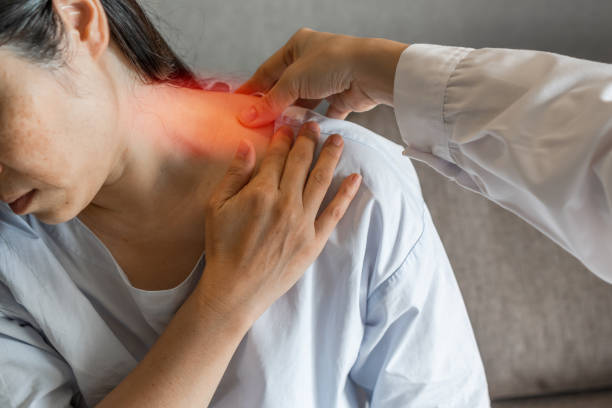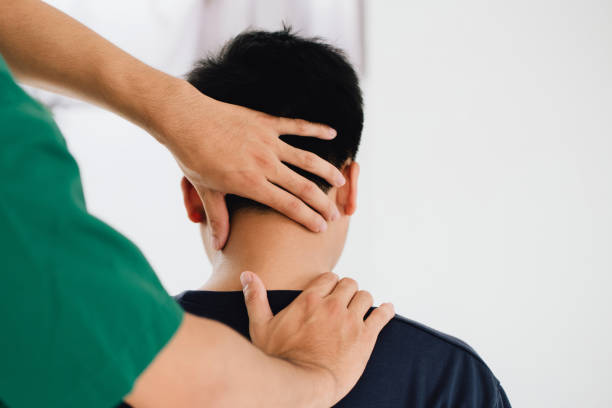A stiff neck can be frustrating but it is typically not a sign of a serious medical condition. Over-the-counter medications like ibuprofen and acetaminophen can relieve pain and reduce inflammation.
Ice packs are most effective within the first 48 hours of a flare up, but heat may also be helpful. Gentle, slow range-of-motion exercises of the neck can help reduce stiffness and promote healing.

Infections
Infections are a possible cause of neck pain. A viral infection that affects the lymph nodes in your neck, such as Epstein-Barr virus (EBV) or a bacterial infection such as tuberculosis, can cause these nodes to swell and become tender. Neck pain from these types of infections can also be accompanied by fever, headache and a general feeling of unwellness.
A stiff neck accompanied by a bad headache and a fever can be an early sign of meningitis, a dangerous bacterial infection that affects the brain and spinal cord. If left untreated, meningitis can cause permanent damage to the brain and spine.
If your neck pain is accompanied by a sensation of pins and needles in your arm or hand, weakness or numbness, you should seek medical attention immediately. These symptoms are a sign that the nerves in your cervical spine have been compressed, causing cervical radiculopathy. This usually occurs when a herniated disc or bone spur in your cervical spine presses on adjacent nerves, resulting in inflammation and a painful and stiff neck.
Over-the-counter NSAIDs, such as ibuprofen (Advil, Motrin IB) or acetaminophen (Tylenol), can reduce the inflammation that causes neck stiffness and soreness. If the discomfort persists, try performing gentle neck stretches or having a friend or family member massage your neck gently. In severe cases, a doctor may need to perform X-rays, computed tomography (CT) scan or magnetic resonance imaging (MRI). These tests can provide a detailed look at the bones and tissues in your neck and help diagnose the condition that is causing the stiffness and soreness.
Cancer
If neck pain is not relieved by over-the-counter medication or stretches, a visit to a primary care physician and/or a specialist should be considered. Serious causes of neck pain may include a herniated spinal disc, nerve compression, or serious infections such as meningitis or cervical cancer.
Many people develop a stiff neck for no apparent reason. They may have slept in the wrong position or climbed a ladder to clean their gutters. Others suffer from chronic neck problems, such as osteoarthritis of the cervical spine (neck arthritis), herniated disks, or stenosis of the spinal canal. These conditions can cause pain and discomfort, but they are not always serious.
If a person experiences neck pain, especially if they have difficulty moving their head to one side, it is a sign that something is wrong. Neck pain can be a warning sign of nerve damage, which may occur from a pinched nerve in a muscle spasm or when a slipped disk compresses the spinal cord. Infections in the neck can also cause pain and stiffness. They can be caused by viruses, bacteria, or fungus.
A healthcare provider will usually diagnose a stiff neck with a medical history and physical exam. They will determine if the neck is painful and how long it has been painful, as well as how much movement of the neck can be done. They will also ask about any red flag symptoms, such as a fever, loss of bowel or bladder control, or headache. They will recommend treatments, which might include over-the-counter ibuprofen or acetaminophen and applying ice and heat. A physical therapist might provide a program of neck exercises and stretches.

Herniated Discs
Your neck is made up of a series of vertebrae, and in between each of these bones are discs. These discs are filled with a jelly-like substance and act as cushions for the spine. When a herniated disc occurs, it can press against nerves and spinal cord in the neck, causing pain, numbness and weakness. Neck pain from a herniated disc may be sharp and intense and usually occurs on one side of the body.
Stiff necks can often be caused by minor muscle strain or injury or by sleeping in an odd position. They can usually be relieved by doing some simple stretches, applying hot and cold compresses or taking over the counter pain medications such as ibuprofen or acetaminophen. Changing some of your daily routines and habits can also help to prevent neck stiffness. For example, try not to slouch while sitting or driving. It is also important to sleep with a pillow that supports your head and neck.
When a stiff neck is serious or if it is accompanied by other symptoms, it is best to consult to A Pinch Of Prevention. They will evaluate your condition and determine if any serious cause of your neck pain is present. They will then take a full history and do a physical exam to check for neck injuries, diseases and illnesses that could be contributing to your neck pain.
Spinal Stenosis
In most cases, neck stiffness results from overuse or an injury, and people can relieve it with stretching, hot and cold treatments, massage and over-the-counter pain medications. Stiffness that lasts more than a few days or is accompanied by weakness or numbness is a sign of a serious problem and requires medical attention.
Your neck is a complex system of bones (vertebrae), discs, ligaments and muscles that support your head and allow it to move in several directions. Any abnormalities or injuries can cause pain or stiffness in your neck. The most common causes of neck pain include:
Whiplash injury. This occurs when your neck is suddenly jerked back and forth, such as in a rear-end car accident. This can damage the muscles, ligaments and nerves in your neck.
Spinal stenosis. This condition occurs when the spinal canal narrows, which can pinch the spinal cord or the nerves that exit through the vertebrae in your neck. This can lead to numbness or weakness in your arms, legs or torso.
A doctor will examine your neck and may order X-rays or an MRI to rule out these or other possible problems. Be sure to tell your doctor about any recent illnesses, accidents or injuries that may be related to your neck pain. This information can help your doctor diagnose the problem and recommend the best treatment.





